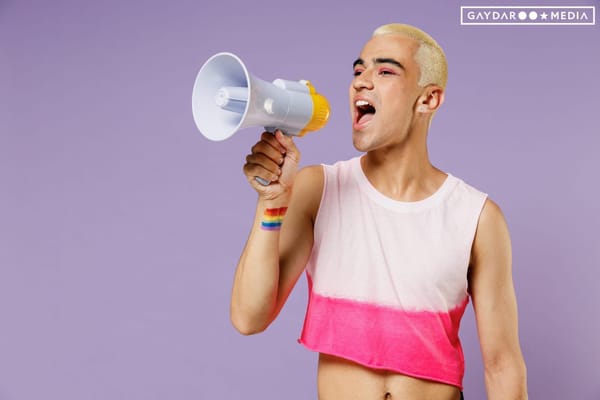Still under attack: Where is our outrage?
Tracking the legislative targeting of LGBTQ people in the US.

By Anthony T. Eaton
In 2023, over 500 bills restricting LGBTQ rights were introduced nationwide. Compare that to the 278 bills targeting our community that the ACLU tracked in 2022.
Think about that for a minute. If both years' numbers represent individual bills and there is no overlap, that is close to one thousand bills aimed at taking away our rights and relegating us to second-class citizens. What is worse is that the strategy is working.
Remember that the number of bills can fluctuate as new legislation is introduced and existing bills are amended or withdrawn. As of mid-2024, over 250 bills restricting LGBTQ rights have been introduced across various state legislatures in the United States. This figure is on par with the previous year. It reflects a continuing trend seen in earlier years with a focus on issues such as transgender healthcare, participation in sports, and the inclusion of LGBTQ topics in education.
Given the blatant attacks on our hard-fought rights, legislators around the country are trying to weaken civil rights laws and make us and those who support us criminals. Several states are known for having particularly restrictive LGBTQ laws, but Florida and Texas stand out for their extensive and aggressive legislative actions against LGBTQ rights.
In Florida, Under Governor Ron DeSantis, Florida has enacted a series of restrictive measures, including:
- Laws prohibiting gender-affirming care for minors.
- Restrictions on transgender athletes' participation in sports are consistent with their gender identity.
- Legislation like the "Parental Rights in Education" law (often referred to as the "Don't Say Gay" law) limits discussions about sexual orientation and gender identity in schools.
Texas has also implemented several restrictive policies, such as:
- Efforts to ban gender-affirming medical treatments for minors.
- Regulations restricting transgender students' participation in school sports.
- Laws that allow individuals and organizations to deny services based on religious beliefs can impact LGBTQ people.
Several states and localities in the U.S. have enacted bans or restrictions on flying the Pride flag, often as part of broader legislative efforts targeting our community symbols and expressions. A few states have passed laws prohibiting the display of LGBTQ flags on government buildings. In 2023, South Dakota passed a law banning the display of flags other than the U.S. and state flags on government property.
Various local governments and school districts have also implemented similar restrictions. These restrictions aim to limit the display of flags other than the official state or national flags and are often spearheaded through specific city or county ordinances or school board policies.
Some states and local governments have enacted or proposed legislation restricting or prohibiting drag performances, often citing concerns about "protecting children" or maintaining public decency.
- In 2023, Tennessee passed a law banning "adult cabaret performances" on public property and in places where children might be present. The law was interpreted to include drag performances. It faced legal challenges and was temporarily blocked by federal courts.
- Florida's legislature passed a law targeting drag shows, particularly those that involve minors. The law includes restrictions on where and when such performances can take place. Similar to Tennessee, Florida's law has been challenged in court.
- Texas has introduced bills aiming to restrict drag performances, especially in venues accessible to minors. These proposals have varied in scope and specificity. Although some bills have passed, others remain under consideration or face legal scrutiny, and legislative efforts continue.
In addition, cities and counties across the U.S. have implemented or considered local ordinances restricting drag performances, particularly in areas frequented by minors or public spaces.
Many of these laws face legal challenges from LGBTQ advocacy groups, arguing that such restrictions infringe on First Amendment rights and are discriminatory. These restrictions have sparked significant public debate, with many advocates arguing that these laws are part of a broader effort to marginalize LGBTQ communities and restrict freedom of expression.
There has been a notable increase in book bans across the U.S. targeting LGBTQ themes and content. Our history is being erased by restricting access to cultural information through book bans around the country. Many bans occur in school libraries, where books featuring LGBTQ characters, themes, or authors are often targeted. Arguments about appropriateness for children or concerns about parental rights are frequently used to justify these bans. Although less common, some bans also affect public libraries.
Once again, we look at states like Florida that have seen significant controversy over book bans. Books featuring LGBTQ characters or themes have been challenged and removed from some schools. In Texas, efforts have been made to ban books related to LGBTQ issues in various school districts. Similarly, in Tennessee, some school boards have implemented restrictions or bans on books with LGBTQ content. North Carolina, Missouri, and Ohio have also seen local school boards or libraries restrict or remove books featuring LGBTQ characters or themes.
Bans on transgender healthcare and sports participation in the United States have seen a significant increase in legislative activity and ongoing legal battles. Several states have enacted laws that restrict or ban gender-affirming healthcare for minors. These typically include hormone therapy, puberty blockers, and surgeries.
Not surprisingly, Florida passed legislation banning gender-affirming care for minors, and this law is actively enforced. Texas has implemented restrictions on gender-affirming treatments for minors, with ongoing legal and political debates about its enforcement and scope. Arkansas passed a ban on gender-affirming care for minors, though legal challenges have complicated its enforcement.
Several states have passed laws that restrict transgender individuals' participation in sports according to their gender identity.
Tennessee enacted legislation banning transgender women and girls from participating in female sports categories in schools and colleges. Similar to Tennessee, Mississippi has laws prohibiting transgender women and girls from competing in female sports, and Idaho has also implemented restrictions on transgender athletes, with legislation that mandates competing based on the sex assigned at birth.
These bans and restrictions are part of a broader national trend of state-level legislation targeting LGBTQ+ rights.
While we have won the right to marry, let's not forget that discrimination against LGBTQ+ individuals in housing still exists. While federal protections have expanded in some areas, there are still significant gaps in coverage. In many states, LGBTQ+ individuals do not have explicit protections against housing discrimination. In those states, landlords or property managers can discriminate based on sexual orientation or gender identity without legal consequences. Additionally, the legal protections against employment discrimination for LGBTQ+ individuals vary significantly across the country. These discriminatory practices make the need to fight these bans and restrictions because, with each new one, it makes it harder for us to change existing laws.
We continue to be under attack, so as I asked in a previous article on this topic, I ask again, where is our outrage?
- In 2023 Tennessee passed a law in banning "adult cabaret performances" on public property and in places where children might be present. The law was interpreted to include drag performances. he law faced legal challenges and was temporarily blocked by federal courts.
- Florida's legislature passed a law targeting drag shows, particularly those that involve minors. The law includes restrictions on where and when such performances can take place. Similar to Tennessee, Florida’s law has been challenged in court.
- Texas has introduced bills aiming to restrict drag performances, especially in venues accessible to minors. These proposals have varied in scope and specificity. Although some bills have passed, others remain under consideration or face legal scrutiny, Legislative efforts continue.
In addition, there are cities and counties across the U.S. that have implemented or considered local ordinances to restrict drag performances, particularly in areas frequented by minors or public spaces.
Many of these laws face legal challenges from LGBTQ advocacy groups, arguing that such restrictions infringe on First Amendment rights and are discriminatory. These restrictions have sparked significant public debate, with many advocates arguing that these laws are part of a broader effort to marginalize LGBTQ communities and restrict freedom of expression.
There has been a notable increase in book bans across the U.S. targeting LGBTQ themes and content. Our very history is being erased through the restriction on access to our cultural information through book bans around the country. Many bans occur in school libraries, where books featuring LGBTQ characters, themes, or authors are often targeted. Arguments about appropriateness for children or concerns about parental rights are frequently used to justified these bans. Although less common, some bans also affect public libraries.
Once again, we look at states like Florida that has seen significant controversy over book bans. Books featuring LGBTQ characters or themes have been challenged and removed from some schools. In Texas efforts have been made to ban books related to LGBTQ issues in various school districts. Similarly, Tennessee, some school boards have implemented restrictions or bans on books with LGBTQ content. North Carolina, Missouri, and Ohio have also seen local school boards or libraries restrict or remove books featuring LGBTQ characters or themes.
Bans on transgender healthcare and sports participation in the United States has seen a significant increase in legislative activity and ongoing legal battles. Several states have enacted laws that restrict or ban gender-affirming healthcare for minors. This typically includes hormone therapy, puberty blockers, and surgeries.
Not surprisingly, Florida passed legislation banning gender-affirming care for minors, and this law is actively enforced. Texas has implemented restrictions on gender-affirming treatments for minors, with ongoing legal and political debates about its enforcement and scope. Arkansas passed a ban on gender-affirming care for minors, though legal challenges have complicated its enforcement.
A number of states have passed laws that restrict transgender individuals' participation in sports according to their gender identity.
Tennessee enacted legislation banning transgender women and girls from participating in female sports categories in schools and colleges. Similar to Tennessee, Mississippi has laws prohibiting transgender women and girls from competing in female sports and Idaho has also implemented restrictions on transgender athletes, with legislation that mandates competing based on the sex assigned at birth.
All of these bans and restrictions are part of a broader national trend of state-level legislation targeting LGBTQ+ rights.
While we have won the right to marry, let’s not forget that discrimination against LGBTQ+ individuals in housing still exists. While federal protections have expanded in some areas, there are still significant gaps in coverage. In many states, LGBTQ+ individuals do not have explicit protections against housing discrimination. This means that in those states, it is possible for landlords or property managers to discriminate based on sexual orientation or gender identity without legal consequences. Additionally, the legal protections against employment discrimination for LGBTQ+ individuals vary significantly across the country. This makes the need to fight these bans and restrictions because with each new one, it makes it harder for us to change existing law. It is not enough to just vote, we must be vocal and we must be visible because we continue to be under attack so, I ask again, where is our outrage?
Anthony T. Eaton is a freelance writer who specializes in LGBTQ topics, other works can be found on his website www.espressotalks.com
How's Your Gaydar?
Connect with guys near you.












